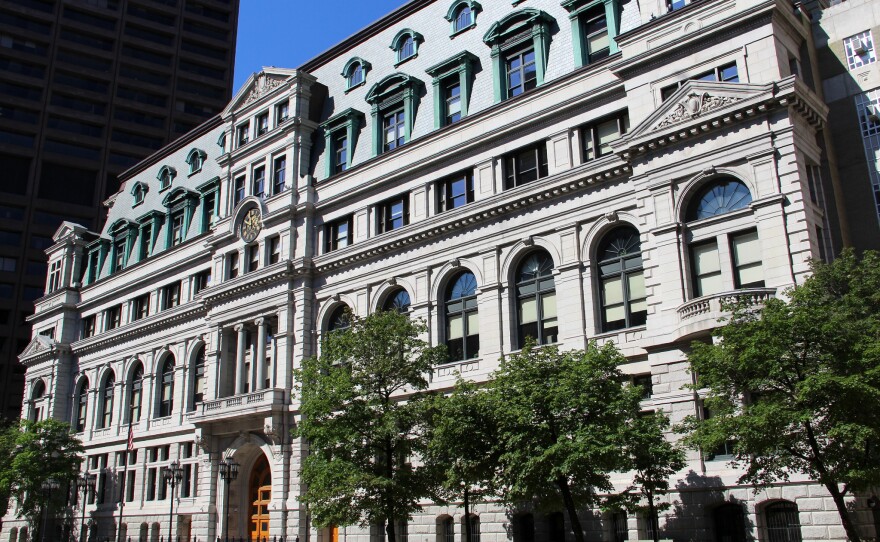The death of Supreme Court Justice Ruth Bader Ginsburg and the fight over the vacancy has political implications in New England — and it comes as the highest court in Massachusetts also faces upheaval.
Last week, the chief justice of the Massachusetts Supreme Judicial Court died. Ralph Gants was just 65 years old.
That means that Governor Charlie Baker will have two picks to make for the court, as Justice Barbara Lenk reaches the mandatory retirement age in December.
Matt Murphy of the State House News Service joins us to talk about, among other things, what he's hearing from Baker.
Matt Murphy, State House News Service: The governor has just a few months before Justice Lenk is due to leave in December. Her early retirement age puts the pressure on him to find these two new justices, which would have him appointing all of the justices on the state's highest court.
The pressure is on him to both increase the diversity, racially, as they lose another woman from the court, gender-wise — and also experientially, as he may look to find someone with a different background other than just a prosecutorial background that a lot of the justices on the court have.
But this will really give Baker a virtually unprecedented mark on the court as governor, having put all of the justices on the bench, including now his choice of whether to elevate one of the existing judges to the role of chief justice, or to pick from outside the court and install someone brand new as the chief justice of the SJC.
Carrie Healy, NEPM: After Ginsburg's death, Baker sent out a statement calling for no nomination or confirmation of a new Supreme Court justice until after the presidential election. We saw a similar statement from another Republican governor in a New England blue state, Phil Scott of Vermont. Baker tries to avoid national politics. Did he have any choice but to weigh in on this one?
The real coincidence here is the fact that Justice Ginsburg's death came the same day that Governor Baker and Governor Larry Hogan — another Republican governor, of the blue state of Maryland — chose to endorse Susan Collins, the incumbent Republican running for Senate in Maine.
Politically, perhaps, it's not a huge surprise, given that Baker and Collins know each other. She's actually a former deputy treasurer of Massachusetts back under John Malone, when the governor was involved in state politics with Bill Weld and working at the Statehouse.
But the timing of that, and given the implications of Republican control of the U.S. Senate, it did feel like the governor had to say something about the future SJC pick.
And he did put out that statement saying that they should wait until after the election. The timing here certainly harkens back to the death of Justice Scalia, when Obama picked Merrick Garland, who never got a hearing. But that was actually much further before the election. This is even closer. And the politics here are going to be very, very interesting to watch the next month and leading to November 3.
A little bit of good news for the Massachusetts economy: the unemployment rate in August dropped almost 5 points from July. It's still in double digits, though. The state is looking at a multi-billion-dollar deficit that could lead to service cuts and more lost jobs. Is there an overarching plan from state officials other than "It's just going to get better after the pandemic"?
It was good news. And Massachusetts, now, no longer has the worst unemployment rate in the country, though, it is still higher than the national average.
Legislative leaders on Beacon Hill are planning to push forward now. We're expecting to see a budget plan within the next couple of weeks — at least a plan for how they want to proceed. They had been hoping for more clarity from Congress about whether to expect another relief package, and whether that package would include funding for states and local government.
Some are more optimistic than others. The Senate Ways and Means Chairman Michael Rodrigues is saying he has been advised not to expect any money from Congress. He is proceeding as if they're going to be facing a $5 billion deficit, which he says will require deep draws on the state's three-and-a-half-billion-dollar reserve fund to avoid slashing programs and other services.
Senate President Karen Spilka, on the other hand, is optimistic after Speaker Nancy Pelosi said the Congress would remain, or at least the House would remain, in session until they get another deal done.
So, there are still a lot of eyes on Washington, D.C., to see if they come riding to the rescue. But we expect to know more about what the state's budget planning will look like in the coming weeks.







